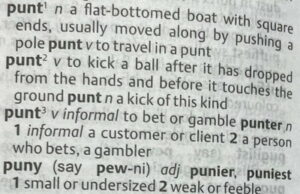 There are many words used in relation to gambling. Some of them are easy to understand and use, while others may not be so. People who partake in gambling sometimes get referred to as different things. Gamblers. Bettors. Players. ‘Punters’ is a word that they often go by.
There are many words used in relation to gambling. Some of them are easy to understand and use, while others may not be so. People who partake in gambling sometimes get referred to as different things. Gamblers. Bettors. Players. ‘Punters’ is a word that they often go by.
A common term for people betting in the United Kingdom, its meaning is often understood. The question is, where exactly did this word come from? How did it make its way into the gambling world and the English language? Does it have its origins in the distant past?
That’s what we’re here to look into today.
The word ‘punter’ is synonymous with gambling, but has that always been the case? Furthermore, we’d like to know if people use it to refer to anything else other than a gambler.
The Dictionary Definition of the Word

The word ‘Punter’ is a noun, of course. The Cambridge English Dictionary has a few definitions relating to it.
The first is very much relevant to gambling. The following dictionary description is in place:
Punter noun (GAMBLER)
- A person who gambles (= risks money guessing the result of something)
That’s the definition we are all aware of, in general. But does it have any other meanings in English? Well, according to the dictionary, it does. ‘Punt’ or ‘punter’ is a word used in the following other ways:
Punter noun (CUSTOMER)
- A customer; a user of services or buyer of goods
Punter noun (BOAT)
- A person who travels in a punt
For this article, we are of course looking at the first description of the word. It helps that the dictionary manages to solidify the meaning of the word. Yet that has little insight into the history of it.
A Look Back in History at ‘Punter’

The origin of the word ‘punter’ is not 100% clear. In the Oxford English Dictionary suggests that it could be a combination of words. It highlights the French ‘ponte’ and ‘ponter’, as well as the Spanish ‘punto’ words. All those terms come from a selection of card games. A main card game that comes to mind is the game of Punto Banco – a form of baccarat. There is a bit of an argument against this being the case, though.
Chronologically, it doesn’t make sense for this to be right. ‘Punter’ is a word that appeared almost 100 years before Spanish or French terms entered into the English language. As it happens, the earliest instance of the word is from 1571. At that time, it was used in a list of qualities required by a priest during inspection by the bishop.
That list of criteria reads as follows:
“Whether your Person, Vicar, or curate, doth openly or secretly, teach or maintaine any erronious or superstitious doctrine. And whether he doe keepe anye suspected woman in his house, or be an inconuenient person, giuen to dronkennesse, or ydlenesse, or be a haunter of Tauernes, Alehouses, or suspected places, a Punter, Banker, Dicer, Carder, Tabler, Swearer, or otherwise give any euill example of life.”
The issue with this text is that the scan of the work is not of good quality. It seems as though ‘punter’ is the word used. Confirmation of this will only be possible with a clearer scan of the text, though.
Spanish and French terms did not start appearing until the second half of the 17th century. At least, as far as evidence tells us. It may be that they arrived earlier than this and no record of it exists at that time. Or it may be that the words went on to reinforce the term that already existed.
The Spanish word ‘punto’ came about in describing a game of ombre from 1660. It describes the fourth highest card in a red trump suit (the Ace). Yet this does not operate as a Matador in the game, which are cards with special privileges.
Come the end of the 17th century, ‘punt’ is in use to describe a gambler betting against the bank. This refers to the bet taken in games of baccarat, faro or basset. Thomas D’Urfey wrote about it in his 1698 play entitled The Campaigners. The play was first staged at the Theatre Royal in Drury Lane.
In the text of the restoration comedy, a character states:
“Because I had a little ill luck last night, which was look’d upon as a Miracle too by all the Bassett-Table, the most skilful of all the Punts bless’d himself to see’t; for during the time of play, I had once from an Alpiew or Paroli, Sept et la va, Quinze et le va, Trent en le va: Nay, once Soissant et le va, and yet lost all at last, but ’twas a thousand to one, my Dear.”
D’Urfey would once again use the word in a 1704 poem entitled Hell Beyond Hell: or the Devil and Mademoiselle. A note within on the word ‘punts’ explained it as “a term for Basset-Players”. This seems to suggest that readers may not have understood the word at the time. Yet soon after, the verb ‘to punt’ appears in text.
A fictional journal published in the Spectator in 1712 states:
“THURSDAY. From Eleven at Night to Eight in the Morning. Dream’d that I punted to Mr. Froth.”
The Gambling Link Has Stuck
 By the start of the 18th century, there is little doubt that ‘punt’ always related to gambling. It is not found in so many texts in the proceeding years, though. In fact, up until the 20th century, it appears rarely. At that point, it becomes a general word. Things took a bit of a wayward turn with the word in the 1930s, though.
By the start of the 18th century, there is little doubt that ‘punt’ always related to gambling. It is not found in so many texts in the proceeding years, though. In fact, up until the 20th century, it appears rarely. At that point, it becomes a general word. Things took a bit of a wayward turn with the word in the 1930s, though.
Philip Allingham wrote a book called Cheapjack, which defines the word in a different way.
“Punter: A grafter’s customer, client or victim; a “sucker”.”
This suggests that it is someone who is likely to fall victim to a conman. The likelihood is that this still related to someone partaking in gambling, though.
It’s interesting to note that the term has not made its way into American English. It is very much a British word in this way (although appears in Australia and New Zealand). Xavier “Gipsy” Petulengo wrote a book in 1936 called A Romany Life. This was all about his life travelling and selling herbal cures around the world. He does write about heading to Kentucky, describing the “negro population” as good “punters”. In this, he is referring to his herbal pills, which seemingly sold well with the people there.
While that book does refer to his travels in the USA, Petulengo was English. He is using British words to describe the people he came across in America.
The word took another deviation away from the gambling link in 1946. At that point, Stanley Jackson used it in his book Indiscreet Guide to Soho. Within that text, it describes a prostitute’s client. Even into the 1970s, utilisation of the word related to the sex industry. The London Sunday Times published an interview with a prostitute at the time. In that interview, the sex worker, Sally, states she will do “anything a punter wants”.
A Link to Rugby, Perhaps?

An alternate suggestion on its origins dates back to the 1800s. It was at this point that the word appeared in a list of rules for rugby gameplay. The context of it at that time surrounded a player being able to push or strike a ball. It could, therefore, have come from the English Midlands word ‘bunt’. This means to push or butt with the head. Rugby players often charge at their opponents. They usually push or knock them out of the way with their heads, shoulders, etc.
From the sport to the act of punting, in 1888 records highlight the word in use. The link to it was that when you punt a ball, you have some idea of where it will go. Of course, you can never be certain on this, you’re taking a punt while punting the ball!
A punt kick in rugby is still in operation to this day. There are various rules in place which highlight the rules around punt kicking. They include the player adopting a balance position, holding the ball in two hands, and more. It could be that we have rugby to thank for its modern-day description.